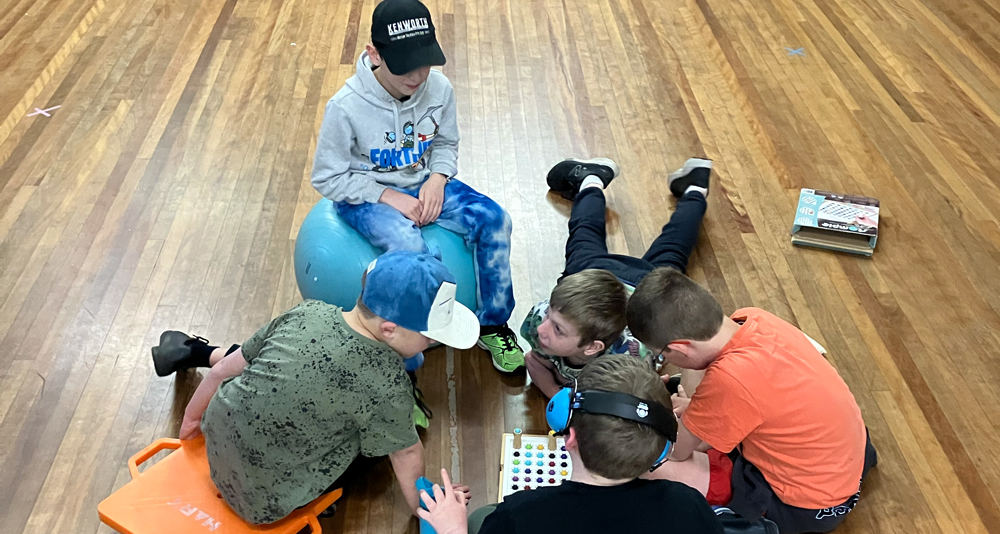
NAVIGATING THERAPY TRANSITIONS: YOUR PATH TO GROWTH, HEALTH, AND ADAPTATION
In our previous blog posts, we discussed various life transitions, such as parenting, regulating emotions, and adapting to change. One of the most significant transitions we experience is therapy transitions, whether as therapists or clients. In this blog, we’ll explore our approach to therapy transitions and the services we offer to ensure the best outcomes for our clients and their families.
Client-Centred Approach
At Explore and Soar, we believe that every child’s journey is unique, which is why one of our values is “Client Adaptability.” We want to work closely with you and your child to achieve your goals and help them grow and adapt so they can engage, connect, and confidently navigate the world in their own way. As Occupational Therapists, we are privileged to help your child. However, we also understand that we are just one tool in your toolbox. Our role is to provide clinical knowledge and reasoning skills while empowering you to make informed decisions about the best path in your child’s therapy journey.
Transitioning Into Occupational Therapy
As a parent, transitioning into health services, such as Occupational Therapy, can be overwhelming and daunting. Our mission is to make accessing services as seamless as possible, providing high-quality intervention support to help achieve your goals.
We understand the mixed feelings that come with reaching out to us, whether through a phone call or an email. However, we are here to help and work with you. The best way to start is by having a phone conversation with us. Talking to someone and gaining clarity on the next steps can be reassuring. Depending on your individual needs, we can provide different therapy intervention options customised for each child and family’s needs. So, rest assured that we are here for you every step of the way.
Factors Considered in Therapy Recommendations
When recommending therapy supports, we consider several critical factors, including –
- Your child’s age and development stage.
- Motivation and ability to participate in therapy.
- Functional goals tailored to your child’s needs.
- Critical periods in your child’s life include early intervention and key transition periods.
- Your family’s motivation, availability, and ability to support your child’s therapy journey.
- The level of clinical knowledge and support required to attain the desired goals.
Based on these factors, we make clinical recommendations on the best approach for your child’s therapy journey.
Range of Therapy Options
At Explore and Soar, we use different intervention frequencies to work towards your child’s specific and diverse goals. Some goals can be achieved quickly, while others may take longer or may only partially achieve. This doesn’t mean that your child should be in therapy interventions continuously or forever.
Regular Term-Based Appointments
- Regular term-based appointments are offered based on school terms. This is one of the most common intervention therapy approaches we implement.
- This allows for regular ongoing therapy, enabling us to check in at regular intervals to modify and adjust therapy intervention to work towards achieving an individual’s goal.
- Depending on the situation, we may offer either fortnightly appointments (5 sessions per term) or weekly appointments (10 sessions per term).
- This helps us adjust intervention recommendations for further practice and refinement at home, offering a consistent approach for both child and family to work towards goals.
Intensive Therapy
- Intensive therapy involves a daily session for a week, with five sessions in total.
- This approach is ideal for clients who require a high intensity of therapy to achieve their goals or to consolidate their skills. It is particularly helpful for rapid progress and building upon existing skills.
- Intensive appointments are an excellent opportunity for those looking to achieve a specific goal.
- This program consists of five one-hour therapy sessions in a week, in which we expose our clients to hundreds of repetitions of particular exercises, activities, or functional skills in a short period.
- This method allows for increased progress and quicker results compared to our fortnightly therapy sessions. If term appointments do not suit your family, the intensive model is an excellent alternative.
- This type of therapy is effective only if the client’s family fully commits to ensuring that the client attends all five sessions within the week.
- Following up the intensive therapy with home programming is crucial to supporting further development and consolidation of skills.
Block Therapy
- Block therapy interventions follow a structure similar to regular term-based appointments. However, their frequency is slightly different. Instead of being assigned a weekly or fortnightly ongoing therapy session, you will be allocated a block of therapy to work on a specific goal, which may span one school term.
- Once that block of therapy has been completed, there will be an equal-duration break from therapy, followed by re-engagement for another block of therapy in the following term. Alternatively, this could be done over two terms in a year, for instance, six months of therapy followed by six months of integration time.
School Holiday Group Programs
- Exploring small group programs during school holidays is a fabulous way to simulate social interaction in a safe and supportive environment.
- These groups are designed to offer clients opportunities to practice their social skills with others.
- Group programs provide a platform to explore different interests, make new friends, or expand on old friendships in their local communities.
- Group programs offer an interactive and creative way of teaching, supporting, and achieving goals rather than one-on-one sessions with a clinician.
Peer / Sibling Sessions
- At times, one-on-one sessions may not provide enough challenge, while group programs may prove to be too challenging for our clients. In such cases, we find peer sessions to be the most effective therapy intervention approach.
- Peer sessions strengthen our clients’ social relationships with family members, siblings, or other clients. These sessions can help clients build initial connections that may eventually develop into solid friendships.
- They are an excellent way for clients to motivate each other, work towards common goals, and learn how to encourage and support one another.
Home Programming
- Home programming is offered as additional support for our clients to practice and improve their skills or tasks that we work on during our sessions.
- The home program includes strategies, ideas, and activities that can help clients achieve their goals and develop new skills.
- While we understand that our sessions are only a part of the overall support system for your child, we highly recommend completing the home programming set as it is essential for achieving the best possible outcomes in the shortest time.
Integration Time – Therapy Pauses
- Many of our clients require a strong brain-body connection to achieve their goals. Once this connection is made, we can celebrate reaching our goal! YAY!
- Not many people talk about the importance of integration time. After a goal is achieved or a skill is developed, the body needs time to process and integrate the new skill into everyday life. Have you ever learned a new skill and felt unsure of what you were doing, but later, it became second nature? That’s because your brain and body need time to integrate the skill into your lifestyle.
- This is also true for children. Allowing time for pause and integration of new skills gives the brain and body time to practice and refine these goals. It also enables clients, families, and therapists to observe what is happening with the child, their priorities, and what additional support may be required.
- Alternatively, it gives our clients, families, and therapists time to observe what else is happening with the child, what is of concern, and what is a priority in achieving next.
- The timeframe for integration varies for each person and therapy option. For example, with intensives, there is usually a 10-week integration and skill-building period. Ongoing therapy can vary from 3, 6 or 12 months, depending on the length of appointments and required breaks.
- Therapists are still available to provide support and check-in during the integration period. Remember that as the client or family member, you can reach out to the therapist if unexpected issues arise and receive the necessary support.
Parent Coaching Sessions
- We understand that you play a crucial role in your child’s development as a parent or caregiver. By investing time, effort, and support in learning and implementing different strategies in your daily routine, you can become a more confident and effective caregiver.
- The more confident you are in implementing strategies, the more consistent you become, and the quicker positive changes occur for your child.
- This is one of our favourite ways to support you and your whole family. We usually offer these sessions as a one-on-one appointment via face-to-face or telehealth, depending on your preference.
Understanding Family Needs
In reviewing goals for each child and family, we understand that goals are hit or life fatigue is felt; families are busy, and our world is constantly changing; therefore, you may require breaks from therapy at different times in your journey with Explore and Soar.
As so many of our families need to attend multiple services such as physio, speech, and psychology along with OT appointments on a regular basis, then add in school, other activities for the child and siblings, working parents, and the fact that families are generally time-poor we recognise the importance of flexibility and the need to support our families to see that taking a break from therapy is normal, okay and does not mean that we are ceasing to support your family. Instead, we believe it is critical to allow some breathing space for things that we may not be seeing yet to come to light so we can adapt our goals and refine our intervention. Or it may be that you and your child are ready to move to periodic check in’s where we catch up, review one specific goal, provide some ideas & strategies with home programming, and you implement them at home as you are now the key person in being able to do this.
Focus on Mental Health
At Explore and Soar, we prioritise not only your child’s mental health but also your family’s well-being. We recognise the impact of therapy transitions on mental health and aim to provide support that fosters resilience and positive outcomes.
Transitions in therapy can be challenging, but they also signify new opportunities for growth and development. At Explore and Soar, we’re committed to supporting you every step of the way. If you’re ready to embark on the next phase of your child’s therapy journey, we’re here to help. When one door closes, another opens.
Thank you for joining us in exploring transitions in therapy. For more information, please get in touch with us today.
If you’d like to chat more, please don’t hesitate to contact us today! Call us on 0477 708 217 or email admin@exploreandsoar.com.au
Until Next Time,
Lori
PUBLISHED MAY 2024
Trembath, D., Varcin, K., Waddington, H., Sulek, R., Pillar, S., Allen, G., Annear, K., Eapen, V.,Feary, J., Goodall, E., Pilbeam, T., Rose, F., Sadka, N., Silove, N., Whitehouse, A. (2022). National guideline for supporting the learning, participation, and well-being of autistic children and their families in Australia. Autism CRC. Brisbane.
Bailes, A.F.; Reder, R., & Burch, C. (2008) Development of Guidelines for determining frequency of therapy services in a pediatric medical setting. Pediatric Physical Therapy, 20 (2), pp. 194-198.








